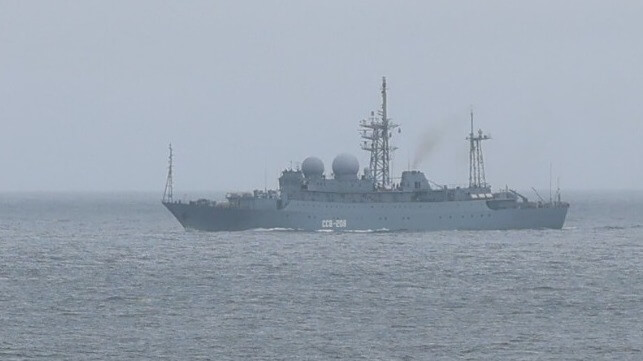U.S. Coast Guard Tracks Russian Spy Ship Off Aleutian Islands

Last week, the U.S. Coast Guard intercepted and followed a Russian Navy surveillance ship off the coast of the Aleutian Islands.
On July 5, while on patrol in the Aleutians, the crew of the medium-endurance cutter USCGC Alex Haley detected a Russian vessel about 30 nautical miles southeast of Amukta Pass, midway between Dutch Harbor and Adak. This area is within the U.S. exclusive economic zone, but well outside of American territorial seas.
The Alex Haley's crew did not communicate with the vessel, according to the Coast Guard. They confirmed that it was a Russian Vishnya-class ship, and they followed as it headed east. An HC-130 aircrew from Coast Guard Air Station Kodiak also monitored the vessel.
By hull markings in released imagery, the Russian ship can be identified as the signals intelligence vessel Kurily (SSV 208). The Kurily dates to 1987, the waning days of the Cold War; she is lightly armed with short-range air defense weaponry and is equipped for intercepting communications signals.

that matters most
Get the latest maritime news delivered to your inbox daily.
“As a proud Alaska-homeported cutter, we patrol to uphold maritime governance and a rules-based international order,” said Cmdr. Steven Baldovsky, commanding officer of the Alex Haley. “We met presence with presence to ensure there were no disruptions to U.S. interests in the maritime environment around Alaska.”
The Coast Guard noted that this kind of interaction is not uncommon in the Bering Sea and the North Pacific. On July 6-7, the National Security Cutter USCGC Kimball tracked three Chinese naval vessels at a position about 100 nautical miles north of Amchitka Pass. At about the same time, a Coast Guard HC-130J aircrew found another Chinese vessel about 70 nautical miles north of Amukta Pass. All four vessels complied with international rules and norms during their transit, according to the Coast Guard.
